Vitamin C for Babies: What to Know
In this episode we're talking about:
- What vitamin C is & what it does for your baby's body
- How to ensure your baby gets enough Vitamin C
- How you can get vitamin C safely into your baby using food
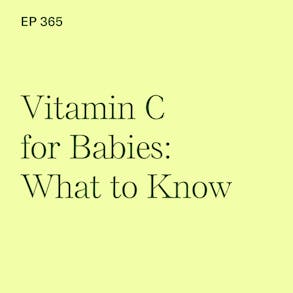
LISTEN TO THIS EPISODE
Episode Description
Feeding a variety of food to your baby is exciting and as your baby transition to eating more solid foods nutrition needs increasingly now come from food - including vitamin C. In this episode, learn about Vitamin C-rich baby foods & more about the role of Vitamin C in your baby's diet. Tune in to gain more the confidence needed to provide a safe start to solid foods using baby led weaning. Happy Feeding!
Links from this Episode
- Baby-Led Weaning with Katie Ferraro program with the 100 First Foods™ Daily Meal Plan, join here: https://babyledweaning.co/program
- Baby-Led Weaning for Beginners free online workshop with 100 First Foods™ list to all attendees, register here: https://babyledweaning.co/baby-led-weaning-for-beginners

Latest Episodes
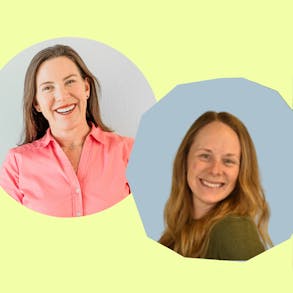
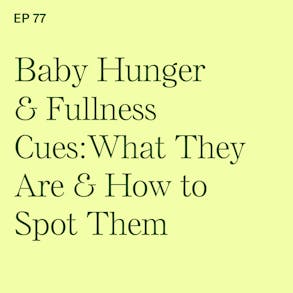
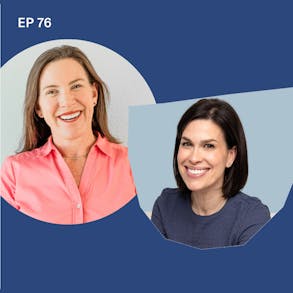
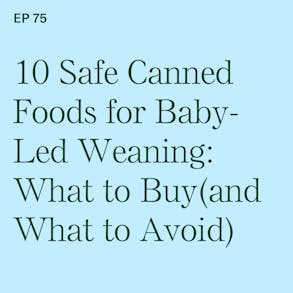
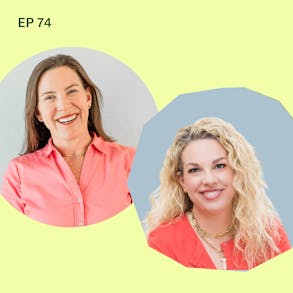
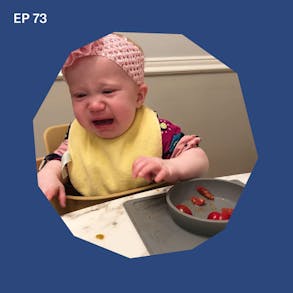
Katie Ferraro (1m 32s):
And while I think most parents are aware of the role that Vitamin C plays on helping their baby absorb iron, what's so unique about Vitamin C is that it helps with the absorption of non-heme iron. So you know, If, you eat animal foods, that type of iron is quite well absorbed by the baby's body. But we also want to incorporate a variety of different plant foods and the type of iron that's in those foods called non-heme iron. When your baby is also having Vitamin C rich fruits and vegetables in the diet, it's helping in two ways by providing the Vitamin C your baby needs for all of the things that Vitamin C does in a baby's body. But it's also helping to enhance the absorption of the non-heme iron that your baby is getting from all these different plant foods that you're introducing. Hey there.
Katie Ferraro (2m 13s):
I'm Katie Ferraro, registered dietitian, college nutrition professor and mom of seven specializing in baby-led weaning here on the Baby Led Weaning Made Easy podcast. I help you strip out all of the noise and nonsense about feeding, leaving you with the confidence and knowledge you need to give you baby a safe start to solid foods using baby led weaning Well. hello there and welcome back. Today we're gonna be talking about a very important micronutrient Vitamin C, and in particular Vitamin C for Babies. And what's important to know as a parent who is starting solid foods with Babies, because all of your baby's Vitamin Z comes from breast milk or formula up until the time they're six months of age.
Katie Ferraro (2m 58s):
And while breast milk and formula continues to provide the majority of nutrition, even after you start solid foods, as the Weaning period starts happening and baby starts getting less nutrition from milk and more nutrition from food, which is the goal, because by age one most of your baby's nutrition can be coming from food Vitamin C increasingly needs to be coming from food. So In, this episode I'd like to talk about what Vitamin C is, what it does in your baby's body, how much Vitamin C your baby needs, how you can get Vitamin C safely into your baby using food. You do not have to rely on supplements. We'll talk a little bit about challenges and solutions and then dip into Vitamin C deficiency and over consumption. But just noting right at the outset that that is very rare.
Katie Ferraro (3m 40s):
And I'm gonna get you outta this episode so that you know everything you need to know about Vitamin C for Babies. Now, I like to start out these mini training episodes with a baby-led weaning tip of the day, and I kind of already teased it, but today's tip is you do not need to stress about Vitamin C because your baby is getting almost all of the Vitamin C that they need from breast milk or formula even after you start solid foods. So there's about five to seven milligrams of Vitamin C in every a hundred milliliters of human milk. And the formulas, commercial infant formulas that is are designed to replicate as closely as they can, but never exactly human milk. So whether your baby is formula fed or breastfed If, you have, you know, approximately a liter around 33 ounces.
Katie Ferraro (4m 25s):
The baby will be getting between 50 and 70 milligrams of Vitamin C. And if we look, as we will In this episode a little bit closer at the needs babies need, it's estimated around 50 milligrams of Vitamin C a day. So just that insurance piece in your mind, I think it's important to learn about nutrients and nutrition, but I don't want you to obsess about them. And I want you to walk away knowing, gosh, it's important for me to start Vitamin C containing foods and give my baby ample time to learn how to eat them. But breast, milk and or formula will continue to provide the Vitamin C that your baby needs. And hang tight because In, this episode I'm gonna be sharing some easy tips on increasing the amount of Vitamin C from foods as your baby gets more proficient at learning how to eat.
Katie Ferraro (5m 6s):
All right, so let's start out by talking about what is Vitamin C? So Vitamin C is also called ascorbic acid. It's a water-soluble vitamin and has a number of different roles in the baby's body. Okay, so what's interesting about Vitamin C is like a lot of the important nutrients, we call it an essential nutrient, meaning it cannot be synthesized by the human body, so it has to be obtained through the diet. And we do that primarily through fruits and vegetables. And perhaps you've heard the story of scurvy. So when sailors used to sail across the ocean for long periods of time, Vitamin C plays an important role in connective tissue and collagen synthesis. So their teeth would fall out, these sailors who did not have access to fresh fruits or vegetables, and then when sometimes they realize, oh wait, but the ones who eat limes, which contain Vitamin C, they call them the Limeys, their teeth did not fall out.
Katie Ferraro (5m 54s):
We'll talk a little bit about scurvy, but it is an incredibly rare situation. So the name ascorbic acid, it actually comes from what's the anti scurvy? So antiscorbutic factor. That's before vitamins were isolated and scientists knew what vitamins were. There was something in lemons and limes and oranges that prevented against scurvy. So Vitamin C does a lot of other things in your baby's body, but when they get teeth, Vitamin C plays a role in collagen formation. So Vitamin C is crucial for the synthesis of collagen. That's a protein that provides structural support to your tissues, like your skin and your cartilage and your bones, and keeping your teeth in place. Vitamin C also plays a role in the immune system support.
Katie Ferraro (6m 36s):
It's probably very well known that Vitamin C has immune boosting properties. As a dietitian, I would argue that most people give way too much credit to the role of Vitamin C. Vitamin C is not going to make your immune system stronger, but having insufficient Vitamin C can cause you to be immunocompromised. So we know that there's a slight role that Vitamin C can play in managing colds like Vitamin C is never going to prevent you from getting a cold, but it'll make the cold length shorter and less intense is what some studies show. Iron absorption is the thing though that we're really interested in as far as roles of Vitamin C go, because Vitamin C enhances the absorption of iron from plant-based foods, like when your baby is learning how to eat different whole grains and those foods contain iron in them, we know that the iron from animal foods is very well absorbed, but Vitamin C helps your baby also absorb iron from plant-based foods.
Katie Ferraro (7m 28s):
And that's important in the transition to solid foods because the stores of iron that your baby got at the tail end of pregnancy, they start to dissipate or dip a little bit after your baby is around six months of age. Not a big deal, nothing to freak out about. We've covered iron extensively on the podcast, but you do start offering iron containing foods and from the plant-based foods, pairing those with Vitamin C rich fruits and vegetables helps your baby's body absorb more of that iron from the other foods. Vitamin C is also an antioxidant, so it protects cells from damage that are caused by harmful molecules called free radicals. So we also know the other rules of Vitamin C include wound healing. So we talked about the role of collagen, that's essential for wound healing.
Katie Ferraro (8m 8s):
So sometimes in a therapeutic setting you'll see supplemental Vitamin C given with, and there's mixed results as to whether or not or how effective that is. In wound healing, So If, a person has insufficient Vitamin C, they would be at increased risk of having a skin breakdown. Now the role, you know, babies don't have a lot of wounds, but they might have minor cuts or scrapes, diaper rash, et cetera. So Vitamin C does play a role in their body's ability to repair these very small injuries. And one of the other things that Vitamin C does is it's responsible for neurotransmitter production. So Vitamin C is involved in helping synthesize certain neurotransmitters in the brain and those infect things like mood and cognitive development. It's kind of more important for older children and adults. But just showing you that you know, Vitamin C is a very multifaceted micronutrient, again, responsible for collagen formation, immune system support, iron absorption, antioxidant defense helps with wound healing and neurotransmitter production.
Katie Ferraro (9m 0s):
So it's crucial as far as a nutrient goes, it supports your baby's growth, their development. And we want to make sure that we're paying attention to a variety of foods. And one of the many reasons that we would do that is in order to ensure adequate Vitamin C Hey, we're gonna take a quick break, but I'll be right back.
Katie Ferraro (9m 55s):
Now how much Vitamin C does your baby need? If we look at the dietary reference intakes set of values based on research, although there's not a ton of it in Babies, it's around 50 milligrams a day. And what basically researchers do is they look at breast milk and about how much breast milk Babies need at a certain age, and then they kind of reverse engineer, okay, well if there's around 50 milligrams of Vitamin C in breast milk that Babies get, then that's approximately how much we need. So we don't have like really hard and fast data about, you know, how much Vitamin C does your baby need. But just to reiterate, you don't need to go supplementing with Vitamin C. Your baby is going to be getting adequate amounts from their infant milk and then eventually from the foods that they're learning how to eat. Let's talk more about those foods.
Katie Ferraro (10m 35s):
What are food sources of Vitamin C? Vitamin C is a water-soluble Vitamin, meaning that your baby's body and your body, you excrete it in your urine if there's extra Vitamin C that your body doesn't need. So once, sometimes we, in the nutrition world talking about people who take, you know really, really high doses of water soluble vitamins, they just essentially have expensive pee because they're gonna urinate out all of the excess amount that they their body doesn't need. And your body can get adequate amounts of Vitamin C from foods, and in most cases, with some exceptions for rare medical conditions, you can achieve adequate Vitamin C status from foods alone. And so fruits and vegetables are good sources of Vitamin C. You've likely heard, you know, telling the scurvy story, but citrus fruits, right?
Katie Ferraro (11m 17s):
Like lemons and limes and oranges, they contain Vitamin C. But the variety of fruits and vegetables that you can include in your baby's diet If, you can keep that variety up. It ensures that you'll get a non-vitamin C. So things like berries, strawberries, for example, are quite high in Vitamin C, red bell peppers are different colored bell peppers. We're a little bit cautious about bell peppers for Babies, and I've shared a lot of content about how to make bell peppers safe, but we don't offer any raw crunchy or crispy red bell peppers to Babies. But the variety is what matters. So in our program, when we introduce five new foods a week, we do a new fruit on Monday, a new vegetable on Tuesday, a new starchy food on Wednesday, a protein food on Thursday, and an allergenic food on Friday. If, you look at that fruit on Monday, whatever the new fruit is, it has Vitamin C in it, whatever the vegetable is, it has Vitamin C in it.
Katie Ferraro (12m 2s):
Some starchy foods, potatoes, for example, contain Vitamin C. When you get to the protein foods, those foods don't have Vitamin C in them, but they have iron. And remember, iron and Vitamin C work together. Your baby's intake of Vitamin C is helping them absorb iron from the plant foods that they're eating. So maybe you're doing some whole grains, they don't have the same type of iron as we see in animal foods, but with the Vitamin C as a helper friend, the baby's body will absorb more of the iron from those plant foods. So you can see how this variety of foods is really important. And sometimes what happens when parents start solid foods, they only know how to feed fruits and vegetables. And while there's Vitamin C in there, that's great. If there's no iron or no fiber or no protein or no allergenic foods, you can see how that would be problematic for the baby.
Katie Ferraro (12m 43s):
So as long as you're working on that variety, and my suggestion is If, you can follow that five step feeding framework and do five new foods a week. It's 20 foods a month. In five months, your baby has learned to eat a hundred different foods, at which point we know they're gonna be getting adequate Vitamin C and iron from their diet If. you wanna grab a copy of my 100 First Foods list? I give it away to everybody on my free online video workshop called Baby-Led Weaning for Beginners. This is a 75 minute video training. Everyone at the end of that gets a copy of the 100 First Foods list. So you'll never run out of ideas of complimentary foods that your baby can be eating. You can sign up for the workshop, you can take it right now, later today, tomorrow, whenever fits your schedule.
Katie Ferraro (13m 24s):
That's at babyledweaning.co. So what are some challenges and solutions when it comes to offering iron containing foods? As with most nutrients, there are problems if a human consumes inadequate amounts. So we call these deficiency diseases or if they consume too much of that, and we call these diseases of toxicity. So we'll start with deficiency. Vitamin C deficiency in infants is relatively rare in a well-nourished population, especially in developed countries where a variety and access to a variety of foods is generally available. Okay, there are some factors to consider when researchers look at the prevalence of Vitamin C deficiency. Breastfeeding is one, so breast milk typically contains Vitamin C, but the levels vary depending on the mother's diet.
Katie Ferraro (14m 5s):
Okay? If the mom has a severe deficiency of Vitamin C in the diet, it can potentially lead to lower Vitamin C levels in the baby and the breast milk. Okay? So in such cases, like we're talking about in cases of, you know, extreme famine and protein, energy malnutrition, the breastfed baby might be at risk, but we know for the most part that the body works very, very hard to provide adequate nutrition to the baby. But Vitamin C content, as with other nutrients in mom's breast milk is to some degree dependent upon the mom's diet of limited dietary variety. Okay? If we're talking about parts of the world where there's a heavy reliance on, for example, a starchy food like cassava or rice, and there's not a lot of other variety in there, there's a very low iron diet. And then of course, if there's no Vitamin C to help the baby absorb the very small amounts of iron in those plant-based starches, there's potential for a nutrient deficiency there.
Katie Ferraro (14m 50s):
And then there are some special medical conditions that can increase the risk of Vitamin C and deficiency in Babies. So there's like certain bowel absorption disorders. If, if there's certain feeding challenges, if there's limited access to fresh foods because of socioeconomic factors, those could all increase the risk of Vitamin C deficiency. Another interesting point about Vitamin C in Babies is with regards to tobacco smoke exposure. So infants who are exposed to secondhand smoke either during pregnancy or after birth, they may have an increased need for Vitamin C and If. you look at the adult recommendations for Vitamin C, it's the only one where there's actually a different set of values for individuals who smoke. Because we know that Vitamin C is an antioxidant and that smoking causes free radical production, you actually need more antioxidants in order to offset the bad work that the smoke is doing.
Katie Ferraro (15m 35s):
So we know that for smokers, they're at higher risk for Vitamin C deficiency. We see that in children who are exposed to secondhand smoke when it comes to over consumption, okay, or having too much for many of the micronutrients, there are what are called upper limits UL set meaning If, you consume a nutrient above the UL amount, it could potentially cause negative health consequences. Now, it's not ethical to design a study whereby we pump Babies full of supplemental Vitamin C and be like, oh, well what's the tipping point where this starts to do damage? Right? So, there is no UL set for Vitamin C in infants. And the reality is, is because there's a relatively low risk of toxicity associated with excessive Vitamin C from food, okay?
Katie Ferraro (16m 16s):
The excessive Vitamin C, if you're ever gonna see it, is going to come from supplemental sources. And you should not be adding any supplements to your baby's diet without an underlying diagnosed micronutrient deficiency and guidance from a credentialed healthcare practitioner. Most practitioners who don't sell supplements are going to try to tell you, listen, your baby can get enough nutrition from the foods alone. Hey, we're gonna take a quick break, but I'll be right back.
Katie Ferraro (17m 31s):
And one interesting thing about Vitamin C with regards to toxicity is that in very high doses or mega doses coming from supplements, again, this is not happening from food Vitamin. C causes GI discomfort. It can cause diarrhea. We see this a lot of time in the healthcare setting. For example, I used to work as a hospital dietitian, and whenever we had a patient who was on a tube feed, a lot of times they would've had, you know, compromised skin status. They might have had skin breakdown, they might be on very high doses of zinc and Vitamin C to help with wound healing, but as a result, it would cause a bunch of diarrhea. The doctor would freak out and say, oh my gosh, the patient has diarrhea. Stop the tube feed. I'm like, it's not two feet that's causing it. It's the high doses of Vitamin C. You do take very high doses of this, which as some people like adults will do around, you know, flu and cold time mistakenly thinking that it's gonna help prevent their cold.
Katie Ferraro (18m 15s):
Again, supplemental Vitamin C has the potential to reduce the severity and the duration of a cold, but it's not gonna prevent it. But some people experience a lot of GI upset and diarrhea. So that's just something to be aware of. But hopefully you're not giving your baby Vitamin C supplements because they can get it from food. Three of my favorite foods to offer to Babies that are good sources of Vitamin C. We start with the fruit category. I certainly love all fruits and vegetables, but strawberries in particular, they can be a little bit challenging to make safe for Babies because they oftentimes tend to be too small for earlier eaters. We have some creative ways that we can get strawberries into a baby's diet safely in a form that they can pick up and feed to themselves. So strawberries are a very powerful source of Vitamin. C from vegetables.
Katie Ferraro (18m 56s):
I absolutely love broccoli 'cause you can cut broccoli florets with like a built-in handle that the baby can pick up and serve to themselves. Of course, we don't offer raw broccoli. We need to cut it the right way and cook it the right way so it's soft and passes the squish test. And then from the starchy food categories, I absolutely love potatoes. Potatoes get dissed on sometimes because, oh, it's just a white carbohydrate. And there are 20 different starchy foods in our program, many of which are whole grain foods. Potatoes are not, but potatoes are a really good source of Vitamin C I know a lot of you think about sweet potatoes, which also have Vitamin C, but when it comes to good old plain white potatoes, you can make them into mashed potatoes, which Babies can practice their preloaded spoon skills with, right? Because it's a nice thick puree. Half the time they eat 'em with their hands and that's fine too.
Katie Ferraro (19m 37s):
But you can also make potato sticks. I usually add they tend to be quite dry, so we need to add a lot of low sodium sauces or dippers or toppers to make them soft. But potatoes are a wonderful source of Vitamin C for baby lead weaning and If. you want help or guidance on how to make all of the 100 first foods on the 100 First Foods safe for your baby. My program Baby-Lead Weaning with Katie Ferraro has a 100 First Foods content library in there where I show you exactly how to prepare each of these foods safely. And then we also have a hundred first days meal plan. If you're like I know I could pick my own five foods each week, but I just want you to do it for me. Katie, we have the a hundred days all laid out where we sequence through different textures. Your baby's learning how to eat more trickier textures, combination foods, getting the allergenic foods in, tell you every single week, which five foods to eat and how to prepare them.
Katie Ferraro (20m 23s):
You can check out the 100 First Foods program. It's part of my Baby-Lead Weaning program at babyledweaning.co. I will link up all of the resources from this episode on the Shownotes, which you can find at blwpodcast.com/365. A special thanks to our partners at AirWave Media If, you guys like podcasts that feature food and science and using your brain. AirWave has some great podcasts for you. We're online at blwpodcast.com. Thank you so much for listening and I'll see you next time. If you're interested in doing baby led weaning, but you're not exactly sure, like what does that mean?
Katie Ferraro (21m 4s):
What does it look like? Where do I start? My online program called Baby-Lead Weaning with Katie Ferraro has everything you need to give your baby a safe start to solid foods and get them to eat over a hundred foods before they turn one, whether you're terrified of choking or maybe you've started but you feel like you're feeding your baby the same foods over and over 'cause you don't know what to feed next, or you're looking for guidance on how to prepare foods safely for your baby's age and stage. My program has exactly what you need. There's five hours of concise self-paced video training. You can knock this thing out during nap time this week. You also get access to my 100 First Foods content library so you can see and learn exactly how to prep all of the a hundred foods as well as my original a hundred days meal plan. I've been refining this program for the last seven years.
Katie Ferraro (21m 46s):
Just today, a mom wrote to me and told me that the a hundred days meal plan has been a quote game changer for her busy lifestyle. When you join the program, you also get access to over a hundred phase two combination food recipes. So you're gonna try out the trickier textures, push your baby's palette. And what's cool about these recipes is your whole family will enjoy them. So everything you need to give your baby a safe start to solid foods is inside of the program. It's created by me, a registered dietitian who specializes in infant feeding. If you're tired of hunting and pecking around the internet trying to piece this stuff together on your own, I put it all in one convenient place for you. I invite you to check out the Baby-Lead Weaning with Katie Ferraro program that's at babyledweaning.co. Again, that website is babyledweaning.co and click on program to learn more.

The Program Baby-Led Weaning with Katie Ferraro
A step-by-step digital program for starting solid foods safely and navigating the original 100 FIRST FOODS™ meal plan with baby-led weaning.
 EXPERT-LED, PROVEN APPROACH TO EATING REAL FOOD
EXPERT-LED, PROVEN APPROACH TO EATING REAL FOOD CONCISE VIDEO TRAININGS TO MASTER BABY-LED WEANING
CONCISE VIDEO TRAININGS TO MASTER BABY-LED WEANING 100 FIRST FOODS DAILY MEAL PLAN WITH FOOD PREP VIDEOS
100 FIRST FOODS DAILY MEAL PLAN WITH FOOD PREP VIDEOS
Baby-Led Weaning for Beginners Free Workshop
Is your baby ready to start solid foods, but you’re not sure where to start? Get ready to give your baby a solid foundation to a lifetime of loving real food…even if you’re feeling overwhelmed or confused about this next stage of infant feeding.
Get baby-led weaning recipes and tips delivered to your email inbox.

